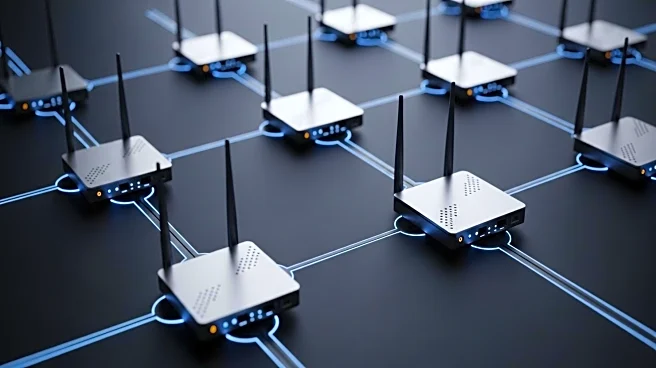What is the story about?
What's Happening?
Industrial cellular routers in Australia have been exploited for smishing campaigns, according to French security vendor Sekoia. The routers, manufactured by Milesight, were found to have misconfigured APIs that allowed unauthorized access, enabling attackers to send phishing messages. The campaign primarily targeted Belgian government service portals, but routers in Australia were also involved. Sekoia discovered over 18,000 Milesight routers accessible via the Internet, with 572 routers misconfigured to allow unauthenticated access. The smishing campaign has been active since at least February 2022, targeting countries like Belgium, Sweden, and Italy. The attacker's infrastructure appears to be linked to a Lithuanian virtual private server provider.
Why It's Important?
The exploitation of industrial cellular routers for smishing campaigns highlights vulnerabilities in network security, particularly in devices with outdated firmware and misconfigurations. This poses a significant risk to organizations and individuals, as smishing can lead to data breaches and financial losses. The widespread targeting of multiple countries indicates a global threat, emphasizing the need for improved cybersecurity measures and regular updates to device firmware. Companies using such routers must ensure proper configuration and security protocols to prevent unauthorized access and protect sensitive information.
What's Next?
Organizations using Milesight routers should review their network security configurations and update firmware to mitigate risks. Security vendors and government agencies may increase monitoring and issue advisories to prevent further exploitation. The incident may prompt discussions on regulatory measures for IoT device security and encourage manufacturers to enhance security features in their products. Stakeholders, including businesses and cybersecurity experts, are likely to collaborate on developing strategies to counteract smishing and other cyber threats.
Beyond the Headlines
The incident raises ethical concerns about the responsibility of manufacturers in ensuring device security and the potential legal implications of data breaches resulting from misconfigured devices. It also highlights the cultural dimension of cyber threats, as attackers exploit language barriers and trust in technology to deceive victims. Long-term, this could lead to shifts in how organizations approach cybersecurity, prioritizing proactive measures and cross-border cooperation to address global cyber threats.

















